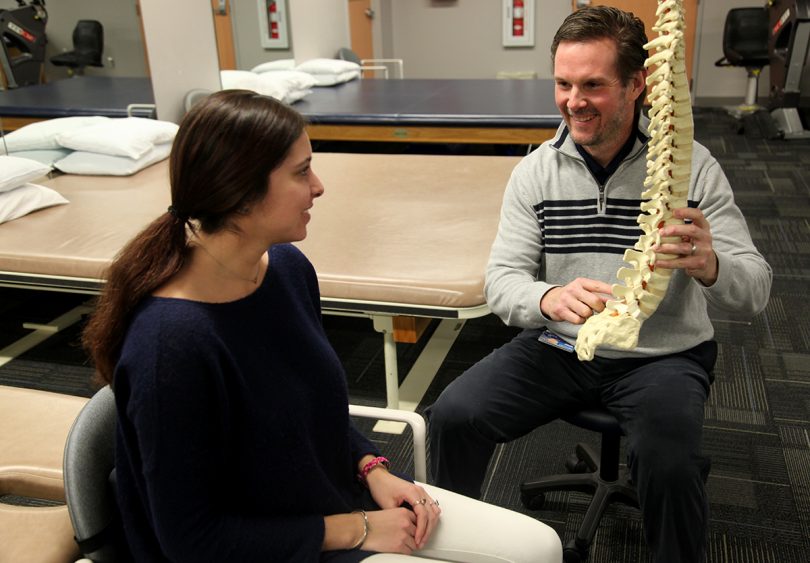Those who have undergone any form of therapy understand that staying committed to the process is an investment. The good news is that Augusta University Rehabilitation offers a cost-effective, time-efficient form of physical therapy — a conservative form of musculoskeletal care.
What makes the treatment cost-effective and time-efficient is that “the physical therapist can put his or her hands on the patient if needed,” said Ted Hanson, a physical therapist at Augusta University Rehabilitation. “However, the goal is always to educate the patients on exercises to do on their own, which limits the need for excessive visits by the patients.”
Mechanical diagnosis and therapy (MDT) is a musculoskeletal assessment process that can be used for the spine and more recently has started to be used for all joints of the body. MDT has been implemented internationally and continues to gain notoriety for its effectiveness as a conservative treatment option. The system is designed to identify if the pain is mechanical — made worse by some movements and better by others — and, if so, to assist the body in healing itself.
“If the patient understands the movements that worsen the pain, attempts to limit them and performs the movements that make the pain better, then he or she can control the problem,” Hanson said. “This will allow the soft tissue to heal.”
Hanson provided the example of a cut finger: “You have to stop bending the finger to separate the cut’s edges and keep it straight so the tissue can heal and close the cut,” he said.
MDT is an effective method for those patients who want control over their pain, need the guidance to “do the right things” to avoid the pain and don’t want to have to rely on medications or surgery. Augusta University Rehabilitation staff includes a credentialed MDT therapist, Hanson, and several others who have received significant formal education and are pursuing credentialed status.
MDT therapists assess the patient through observation, a thorough verbal interview and a physical exam that consists of repeated movements, force progressions and continual reassessment of the patient’s pain location and intensity. Force progressions start with the patient using his or her own force; then the clinician uses his or her force if needed.
“The majority of patients respond using their own force,” Hanson said. “Again, this produces patients who are independent in treating themselves.”
With the information processed from the assessment, the clinician is then able to classify the patient’s pain as mechanical or non-mechanical. If the pain is classified as mechanically responsive, then the patient is deemed a good candidate for MDT. The symptoms are then further classified as one of three MDT syndromes: derangement, dysfunction or postural.
A critical component of MDT is that patients are actively involved in their care, and that starts with educating them on the cause of their pain. Therapists focus on helping patients to understand the activities and positions that produce or increase pain, then walk them through exercises that focus on movements that reduce pain or other symptoms.
MDT therapists seek to help patients to understand their pain and guide them toward becoming independent in their own care. In addition, the patient should be able to prevent future episodes by continuing the prescribed exercises.
Looking to control your back pain without medication and surgery?
To learn more about MDT and whether or not it’s right for you or to make an appointment, visit augustahealth.org/westwheeler, or call 706-446-1399.





